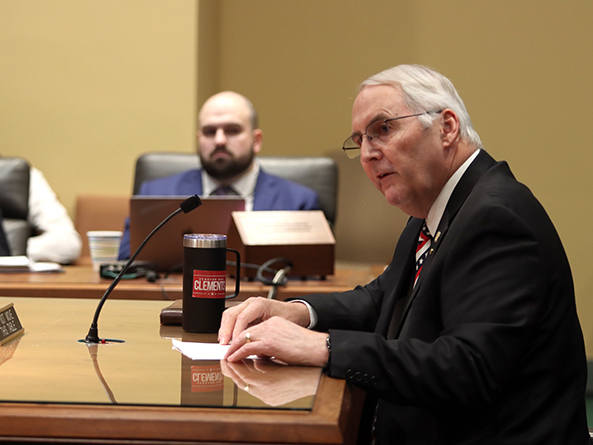Measure to end inheritance tax, reimburse counties considered
Nebraska would phase out the inheritance tax collected by counties while reimbursing them for housing state prisoners under a bill heard Feb. 8 by the Revenue Committee.

In 2022, the Legislature cut Nebraska’s inheritance tax rates while increasing the amount of property value that is exempt from the tax. Under current law, immediate relatives pay a 1% tax on the clear market value of property over $100,000 received by each person.
Under LB1067, sponsored by Sen. Robert Clements of Elmwood, the rate would fall incrementally each year, beginning in 2025, until reaching 0% in 2028. The rates that apply to remote relatives and in all other cases would start decreasing each year beginning in 2024, and also would fall to 0% by 2028.
Clements said the “antiquated, regressive and arbitrary” inheritance tax drives retirees out of the state and unfairly taxes a relatively small number of people. After Iowa ends its inheritance tax next year, he said, Nebraska will be one of only five states in which the tax is collected.
“The 12,000 people per year who paid these taxes have benefited the other 1.8 million Nebraskans who use the county services every year,” he said. “That is why I call this tax unfair.”
Clements said the gradual phaseout would give counties time to adjust to the lost revenue. The bill also would offset part of that revenue loss by restoring a state prisoner reimbursement program that ended in 2009, he said.
LB1067 would require the state Department of Correctional Services to reimburse counties $35 per day for each state prisoner housed in a county jail. Beginning with fiscal year 2024-25, the total annual appropriation for reimbursing county jails could not exceed $3.9 million.
Doug Kagan testified in support of the proposal. Because income and property already are taxed, he said, the inheritance tax is a form of double taxation that discourages accumulation of wealth and property.
“Yes, this tax infuses local budgets — but only minimally,” Kagan said. “Counties claim they use these funds to control property taxes, but [they] sometimes spend the proceeds on extraneous expenditures.”
Testifying in opposition to LB1067 was Randy Obermier, a York County commissioner. He said the county uses its inheritance tax collections to provide services and build up a reserve used to cover unexpected expenses, such as hiring contractors to remove snow after a recent storm.
“If [the inheritance tax] goes away, property taxes will go up — we have no choice,” Obermier said. “There are services we supply, and those services cost money.”
Buffalo County Sheriff Neil Miller also testified in opposition to the bill on behalf of the Nebraska Sheriffs Association. Without inheritance tax revenue, he said, the county could not have partnered with the city of Kearney and the state to replace an aging radio system in 2020.
“If the inheritance tax goes away, we would ask that consideration be given to replacement funding,” Miller said, “so when a large project for public safety comes up … we have a way to pay for it.”
He also asked lawmakers to consider increasing the proposed state prisoner reimbursement rate to better align with current costs and to remove the cap on reimbursements to ensure that counties have a reliable funding source.
The committee took no immediate action on LB1067.


